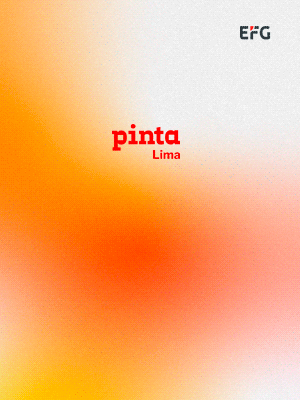AFFECTIVE POETICS: ROSANA PAULINO AT MALBA
Rosana Paulino. Amefricana is the most complete exhibition outside Brazil of this artist born in Sao Paulo in 1967. The exhibition at Malba brings together a group of works made during 30 years, between 1994 and 2024, from the perspective that the Atlantic inscribes in the Afro-descendant America.
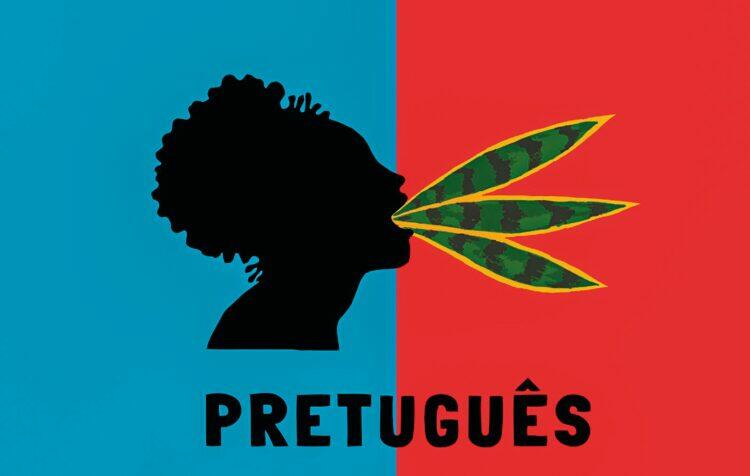
In her installations, drawings, engravings, embroideries and sculptures, Paulino addresses slavery and the violence of the African diaspora in Brazil as the central axis of her practice, which in addition to being artistic is also pedagogical and militant. As a versatile creator, she explores different techniques, with a special attachment to graphics and drawing. Through specific operations –such as stitching, sewing and the use of the archive, among others–, she critically traverses the history of Brazil, problematizing the ethnic construction of the nation.
Paulino's poetic interventions reinscribe the archives of the African diaspora in South America. They are based on a constant dialogue between personal archives, historical archives, reconceptualizations of Brazilian art, interrogations of the matrixes of Western science –its classification systems, its hypotheses, its ways of ordering the world– and also on an approach to the affections and circumstances of black women in Brazilian and Latin American society.
The exhibition, curated by Andrea Giunta and Igor Simões, proposes a journey to approach these concepts from a complex and deeply affective poetics. It includes five large installations, along with drawings, engravings and a video. It is organized into four major nuclei– “Atlantic Memories,” “The Colonial Structures of Science,” “The Narratives of Brazilian Art,” and “Weavings of Subjectivity”– which are not separate zones, but rather axes of meaning that run through almost all of Paulino's works.
The title Amefricana derives from the concept of “amefricanidad,” coined by Brazilian philosopher, black activist, feminist and sociologist Lélia Gonzalez (1935-1994). “Amefrican” are the individual identities, structured in the collective experience, of those who share cultural ties contrary to colonial domination. The term captures particularities of the figure of black women and highlights their active participation in history, unlike other racist and sexist narratives that diminish or suppress their importance.
Rosana Paulino (São Paulo, Brazil, 1967) holds a PhD in Visual Arts from the School of Communication and Arts of the University of São Paulo - Eca/USP, a specialist in Printmaking from the London Print Studio in England and a degree in Printmaking from Eca/USP. She was a Ford Foundation fellow from 2006 to 2008 and Capes fellow from 2008 to 2011. In 2014 she obtained a residency at the Bellagio Center of the Rockefeller Foundation, Italy, and in 2017 she won the Bravo and ABCA (Brazilian Association of Art Critics) awards in the Contemporary Art category. Her work has been exhibited in important museums such as MAM - Museu de Arte Moderna de São Paulo; UNM - University of New Mexico Art Museum, New Mexico, United States and Museu Afro-Brasil - São Paulo, and at the 59th Venice Art Biennale. Her solo exhibitions include The Time of Things, Mendes Wood DM, Brussels (2022); The Stitching of Memory, Pinacoteca do Estado de São Paulo (2018); Atlântico Vermelho, at Padrão dos Descobrimentos, Lisbon (2017); and Black Women at Espace Culturel Fort Griffon, Besançon, France (2014).
Related Topics
May interest you

La Chola Poblete, Argentine artist and LGBTQ+ rights activist, draws confrontation between historical stereotypes and contemporary visual languages. Her colourful works in diverse media disrupt prevailing power structures and celebrate the rich culture of South American Indigenous peoples. Titled after her hometown, Guaymallén is La Chola’s solo exhibition at PalaisPopulaire, curated by Britta Färber, head of Deutsche Bank’s international art and culture program.
LA CHOLA POBLETE EXHIBITS VIRGINS, COLONIALISM AND EROTICA IN GUAYMALLÉN
La Chola Poblete, Argentine artist and LGBTQ+ rights activist, draws confrontation between historical stereotypes and contemporary visual languages. Her colourful works in diverse media disrupt prevailing power structures and celebrate the rich culture of South American Indigenous peoples. Titled after her hometown, Guaymallén is La Chola’s solo exhibition at PalaisPopulaire, curated by Britta Färber, head of Deutsche Bank’s international art and culture program.

La Chola Poblete, Argentine artist and LGBTQ+ rights activist, draws confrontation between historical stereotypes and contemporary visual languages. Her colourful works in diverse media disrupt prevailing power structures and celebrate the rich culture of South American Indigenous peoples. Titled after her hometown, Guaymallén is La Chola’s solo exhibition at PalaisPopulaire, curated by Britta Färber, head of Deutsche Bank’s international art and culture program.
LA CHOLA POBLETE EXHIBITS VIRGINS, COLONIALISM AND EROTICA IN GUAYMALLÉN
La Chola Poblete, Argentine artist and LGBTQ+ rights activist, draws confrontation between historical stereotypes and contemporary visual languages. Her colourful works in diverse media disrupt prevailing power structures and celebrate the rich culture of South American Indigenous peoples. Titled after her hometown, Guaymallén is La Chola’s solo exhibition at PalaisPopulaire, curated by Britta Färber, head of Deutsche Bank’s international art and culture program.

La Mancha Galería presented the first solo exhibition of Benjamín Aitala. Ritmos Visuales (Visual Rhythms) presents paintings produced in the last three years that provide the iconic subject matter and style of the Argentine artist.
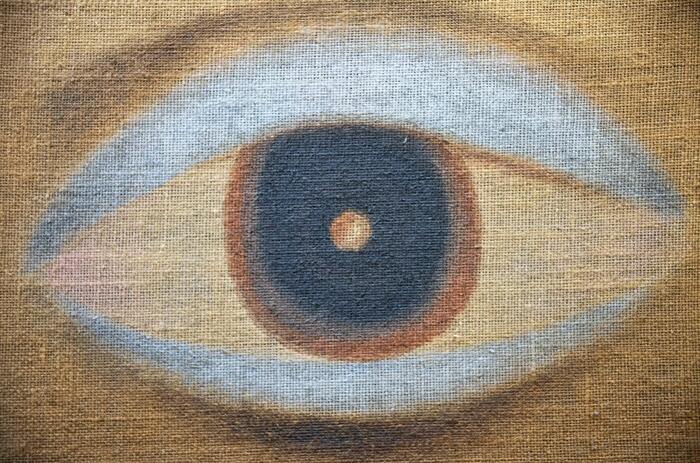
Pinta PArC closed its 14th edition with more than 200 artists and 44 galleries. From April 24 to 28, 2024 at Casa Prado, the fair brought together curators, gallery owners, artists, collectors and art lovers.
PINTA PArC 2024 AMPLIFIED THE LATIN-AMERICAN ARTISTIC EXPRESSION
Pinta PArC closed its 14th edition with more than 200 artists and 44 galleries. From April 24 to 28, 2024 at Casa Prado, the fair brought together curators, gallery owners, artists, collectors and art lovers.

It could have been an ordinary retrospective, but the decision to participate in some way in the creative process is a differential and even declarative point in Tembló acá un delirio, the exhibition that Museo CA2M in Móstoles delves into the figure, and at first hand, of Ana Gallardo (Rosario, Argentina, 1958).
ANA GALLARDO'S RECONSTRUCTION AND “DELIRIUM”
It could have been an ordinary retrospective, but the decision to participate in some way in the creative process is a differential and even declarative point in Tembló acá un delirio, the exhibition that Museo CA2M in Móstoles delves into the figure, and at first hand, of Ana Gallardo (Rosario, Argentina, 1958).

The Museum of Contemporary Art Chicago presented Virginia Jaramillo: Principle of Equivalence, the first major retrospective and largest monographic exhibition to date of the work of Virginia Jaramillo.
VIRGINIA JARAMILLO’S WORK IN THE MUSEUM OF CONTEMPORARY ART CHICAGO
The Museum of Contemporary Art Chicago presented Virginia Jaramillo: Principle of Equivalence, the first major retrospective and largest monographic exhibition to date of the work of Virginia Jaramillo.

The NY spring season has concluded with the major auctions of Contemporary and Modern art. While the sales have not been a disaster, most lots have sold either below or close to the low estimate, with some last-minute withdrawals. One year ago, the May sales already marked a clear recalibration of prices. Over the past 12 months, the market has continued its slowdown, and this week's sales have confirmed the trend. It is not a brusque fall or a crash, but a slow-motion downward spiral in prices, with very few but exciting surprises.
LATIN AMERICAN ART TRIUMPHS AT AUCTION
The NY spring season has concluded with the major auctions of Contemporary and Modern art. While the sales have not been a disaster, most lots have sold either below or close to the low estimate, with some last-minute withdrawals. One year ago, the May sales already marked a clear recalibration of prices. Over the past 12 months, the market has continued its slowdown, and this week's sales have confirmed the trend. It is not a brusque fall or a crash, but a slow-motion downward spiral in prices, with very few but exciting surprises.
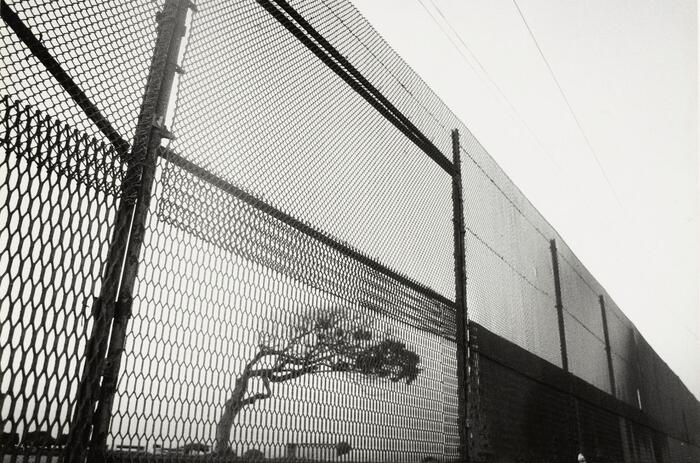
The Philip and Muriel Berman Museum of Art presents the tour of Enrique Bostelmann: Apertures and Borderscapes. The exhibition will be available from June 18 to December 15, 2024.
ENRIQUE BOSTELMANN: APERTURES AND BORDERSCAPES
The Philip and Muriel Berman Museum of Art presents the tour of Enrique Bostelmann: Apertures and Borderscapes. The exhibition will be available from June 18 to December 15, 2024.

Pine Meadow Ranch Center for Arts & Agriculture (PMRCAA) is inviting artists, ecological scientists and scholars whose work explores the theme of Care & Stewardship to apply for a 2025 residency in Sisters, Oregon (USA). Deadline to apply: June 30th, 2024.
OPEN CALL FOR ARTIST-IN-RESIDENCY PROGRAM 2025
Pine Meadow Ranch Center for Arts & Agriculture (PMRCAA) is inviting artists, ecological scientists and scholars whose work explores the theme of Care & Stewardship to apply for a 2025 residency in Sisters, Oregon (USA). Deadline to apply: June 30th, 2024.
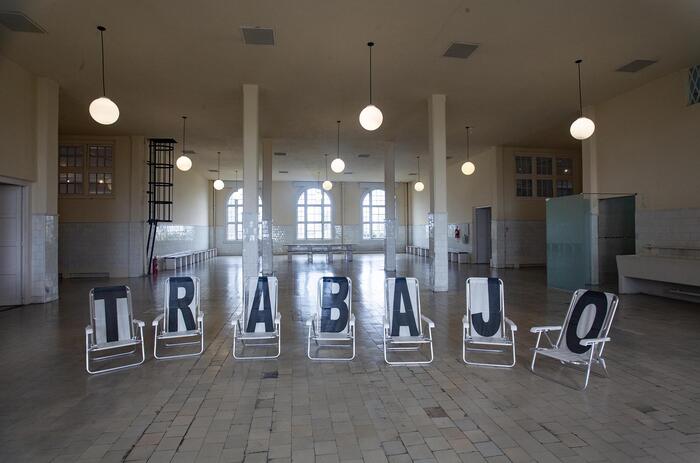
The group exhibition Los gestos del trabajo (The Gestures of Work), curated by Clarisa Appendino and Benedetta Casini, at MUNTREF Centro de Arte Contemporáneo presents works that explore the relationship between bodies, technology and work.
THE GESTURES OF WORK
The group exhibition Los gestos del trabajo (The Gestures of Work), curated by Clarisa Appendino and Benedetta Casini, at MUNTREF Centro de Arte Contemporáneo presents works that explore the relationship between bodies, technology and work.

In Brazil's largest open-air contemporary art center, with an enviable connection between nature and visuality, nautical elements have curiously been the driving force behind important commissioned works. Now at Inhotim, they are central to the metaphors that evoke previous unwanted flows of circulation and, at the same time, act as a reference so that they are not repeated - in this case, the slave trade originating in Africa, whose survivors worked, among other activities, in the exploitation of minerals that sustained the economy of this part of Brazil, today, Minas Gerais.
MOVING GRAVES, REVOLVED TERRITORIES, RESISTANCE IN A NET - GRADA KILOMBA, LUANA VITRA AND ABDIAS NASCIMENTO
In Brazil's largest open-air contemporary art center, with an enviable connection between nature and visuality, nautical elements have curiously been the driving force behind important commissioned works. Now at Inhotim, they are central to the metaphors that evoke previous unwanted flows of circulation and, at the same time, act as a reference so that they are not repeated - in this case, the slave trade originating in Africa, whose survivors worked, among other activities, in the exploitation of minerals that sustained the economy of this part of Brazil, today, Minas Gerais.
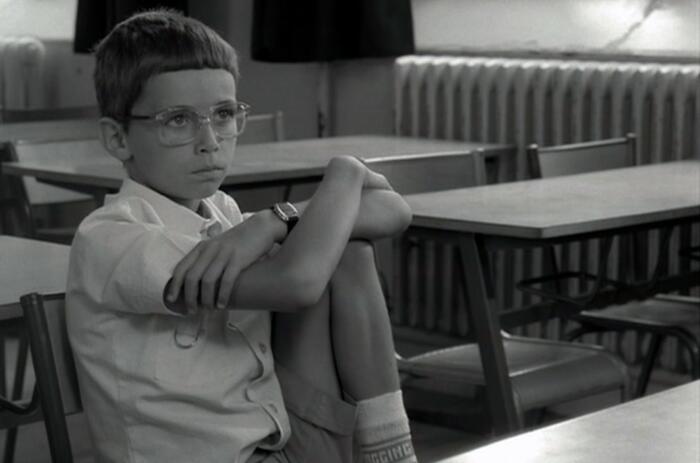
The exhibition Bastardie is built around the practices of slangs, jargons, and other language experiments as laboratories for aesthetic and social positions. The group exhibition at KADIST proposes the following question: how are ways of speaking in constant productive relationships with forms of doing as well as looking?
ACCENTS, GESTURES AND PUNCTUATIONS: A GROUP EXHIBITION IN KADIST
The exhibition Bastardie is built around the practices of slangs, jargons, and other language experiments as laboratories for aesthetic and social positions. The group exhibition at KADIST proposes the following question: how are ways of speaking in constant productive relationships with forms of doing as well as looking?
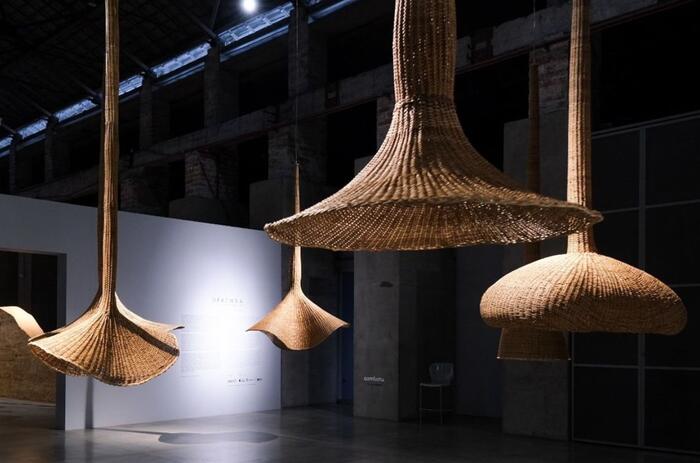
Ofrenda is the first large-scale exhibition of Mexican artist Tania Candiani in the Museo de Arte Moderno de Medellín. It is curated by Emiliano Valdés.
TANIA CANDIANI'S OFFERING AT MAMM
Ofrenda is the first large-scale exhibition of Mexican artist Tania Candiani in the Museo de Arte Moderno de Medellín. It is curated by Emiliano Valdés.

La Chola Poblete, Argentine artist and LGBTQ+ rights activist, draws confrontation between historical stereotypes and contemporary visual languages. Her colourful works in diverse media disrupt prevailing power structures and celebrate the rich culture of South American Indigenous peoples. Titled after her hometown, Guaymallén is La Chola’s solo exhibition at PalaisPopulaire, curated by Britta Färber, head of Deutsche Bank’s international art and culture program.
LA CHOLA POBLETE EXHIBITS VIRGINS, COLONIALISM AND EROTICA IN GUAYMALLÉN
La Chola Poblete, Argentine artist and LGBTQ+ rights activist, draws confrontation between historical stereotypes and contemporary visual languages. Her colourful works in diverse media disrupt prevailing power structures and celebrate the rich culture of South American Indigenous peoples. Titled after her hometown, Guaymallén is La Chola’s solo exhibition at PalaisPopulaire, curated by Britta Färber, head of Deutsche Bank’s international art and culture program.

La Mancha Galería presented the first solo exhibition of Benjamín Aitala. Ritmos Visuales (Visual Rhythms) presents paintings produced in the last three years that provide the iconic subject matter and style of the Argentine artist.

Pinta PArC closed its 14th edition with more than 200 artists and 44 galleries. From April 24 to 28, 2024 at Casa Prado, the fair brought together curators, gallery owners, artists, collectors and art lovers.
PINTA PArC 2024 AMPLIFIED THE LATIN-AMERICAN ARTISTIC EXPRESSION
Pinta PArC closed its 14th edition with more than 200 artists and 44 galleries. From April 24 to 28, 2024 at Casa Prado, the fair brought together curators, gallery owners, artists, collectors and art lovers.

It could have been an ordinary retrospective, but the decision to participate in some way in the creative process is a differential and even declarative point in Tembló acá un delirio, the exhibition that Museo CA2M in Móstoles delves into the figure, and at first hand, of Ana Gallardo (Rosario, Argentina, 1958).
ANA GALLARDO'S RECONSTRUCTION AND “DELIRIUM”
It could have been an ordinary retrospective, but the decision to participate in some way in the creative process is a differential and even declarative point in Tembló acá un delirio, the exhibition that Museo CA2M in Móstoles delves into the figure, and at first hand, of Ana Gallardo (Rosario, Argentina, 1958).

The Museum of Contemporary Art Chicago presented Virginia Jaramillo: Principle of Equivalence, the first major retrospective and largest monographic exhibition to date of the work of Virginia Jaramillo.
VIRGINIA JARAMILLO’S WORK IN THE MUSEUM OF CONTEMPORARY ART CHICAGO
The Museum of Contemporary Art Chicago presented Virginia Jaramillo: Principle of Equivalence, the first major retrospective and largest monographic exhibition to date of the work of Virginia Jaramillo.

The NY spring season has concluded with the major auctions of Contemporary and Modern art. While the sales have not been a disaster, most lots have sold either below or close to the low estimate, with some last-minute withdrawals. One year ago, the May sales already marked a clear recalibration of prices. Over the past 12 months, the market has continued its slowdown, and this week's sales have confirmed the trend. It is not a brusque fall or a crash, but a slow-motion downward spiral in prices, with very few but exciting surprises.
LATIN AMERICAN ART TRIUMPHS AT AUCTION
The NY spring season has concluded with the major auctions of Contemporary and Modern art. While the sales have not been a disaster, most lots have sold either below or close to the low estimate, with some last-minute withdrawals. One year ago, the May sales already marked a clear recalibration of prices. Over the past 12 months, the market has continued its slowdown, and this week's sales have confirmed the trend. It is not a brusque fall or a crash, but a slow-motion downward spiral in prices, with very few but exciting surprises.

The Philip and Muriel Berman Museum of Art presents the tour of Enrique Bostelmann: Apertures and Borderscapes. The exhibition will be available from June 18 to December 15, 2024.
ENRIQUE BOSTELMANN: APERTURES AND BORDERSCAPES
The Philip and Muriel Berman Museum of Art presents the tour of Enrique Bostelmann: Apertures and Borderscapes. The exhibition will be available from June 18 to December 15, 2024.

Pine Meadow Ranch Center for Arts & Agriculture (PMRCAA) is inviting artists, ecological scientists and scholars whose work explores the theme of Care & Stewardship to apply for a 2025 residency in Sisters, Oregon (USA). Deadline to apply: June 30th, 2024.
OPEN CALL FOR ARTIST-IN-RESIDENCY PROGRAM 2025
Pine Meadow Ranch Center for Arts & Agriculture (PMRCAA) is inviting artists, ecological scientists and scholars whose work explores the theme of Care & Stewardship to apply for a 2025 residency in Sisters, Oregon (USA). Deadline to apply: June 30th, 2024.

The group exhibition Los gestos del trabajo (The Gestures of Work), curated by Clarisa Appendino and Benedetta Casini, at MUNTREF Centro de Arte Contemporáneo presents works that explore the relationship between bodies, technology and work.
THE GESTURES OF WORK
The group exhibition Los gestos del trabajo (The Gestures of Work), curated by Clarisa Appendino and Benedetta Casini, at MUNTREF Centro de Arte Contemporáneo presents works that explore the relationship between bodies, technology and work.

In Brazil's largest open-air contemporary art center, with an enviable connection between nature and visuality, nautical elements have curiously been the driving force behind important commissioned works. Now at Inhotim, they are central to the metaphors that evoke previous unwanted flows of circulation and, at the same time, act as a reference so that they are not repeated - in this case, the slave trade originating in Africa, whose survivors worked, among other activities, in the exploitation of minerals that sustained the economy of this part of Brazil, today, Minas Gerais.
MOVING GRAVES, REVOLVED TERRITORIES, RESISTANCE IN A NET - GRADA KILOMBA, LUANA VITRA AND ABDIAS NASCIMENTO
In Brazil's largest open-air contemporary art center, with an enviable connection between nature and visuality, nautical elements have curiously been the driving force behind important commissioned works. Now at Inhotim, they are central to the metaphors that evoke previous unwanted flows of circulation and, at the same time, act as a reference so that they are not repeated - in this case, the slave trade originating in Africa, whose survivors worked, among other activities, in the exploitation of minerals that sustained the economy of this part of Brazil, today, Minas Gerais.

The exhibition Bastardie is built around the practices of slangs, jargons, and other language experiments as laboratories for aesthetic and social positions. The group exhibition at KADIST proposes the following question: how are ways of speaking in constant productive relationships with forms of doing as well as looking?
ACCENTS, GESTURES AND PUNCTUATIONS: A GROUP EXHIBITION IN KADIST
The exhibition Bastardie is built around the practices of slangs, jargons, and other language experiments as laboratories for aesthetic and social positions. The group exhibition at KADIST proposes the following question: how are ways of speaking in constant productive relationships with forms of doing as well as looking?

Ofrenda is the first large-scale exhibition of Mexican artist Tania Candiani in the Museo de Arte Moderno de Medellín. It is curated by Emiliano Valdés.
TANIA CANDIANI'S OFFERING AT MAMM
Ofrenda is the first large-scale exhibition of Mexican artist Tania Candiani in the Museo de Arte Moderno de Medellín. It is curated by Emiliano Valdés.

La Chola Poblete, Argentine artist and LGBTQ+ rights activist, draws confrontation between historical stereotypes and contemporary visual languages. Her colourful works in diverse media disrupt prevailing power structures and celebrate the rich culture of South American Indigenous peoples. Titled after her hometown, Guaymallén is La Chola’s solo exhibition at PalaisPopulaire, curated by Britta Färber, head of Deutsche Bank’s international art and culture program.
LA CHOLA POBLETE EXHIBITS VIRGINS, COLONIALISM AND EROTICA IN GUAYMALLÉN
La Chola Poblete, Argentine artist and LGBTQ+ rights activist, draws confrontation between historical stereotypes and contemporary visual languages. Her colourful works in diverse media disrupt prevailing power structures and celebrate the rich culture of South American Indigenous peoples. Titled after her hometown, Guaymallén is La Chola’s solo exhibition at PalaisPopulaire, curated by Britta Färber, head of Deutsche Bank’s international art and culture program.

La Mancha Galería presented the first solo exhibition of Benjamín Aitala. Ritmos Visuales (Visual Rhythms) presents paintings produced in the last three years that provide the iconic subject matter and style of the Argentine artist.

Pinta PArC closed its 14th edition with more than 200 artists and 44 galleries. From April 24 to 28, 2024 at Casa Prado, the fair brought together curators, gallery owners, artists, collectors and art lovers.
PINTA PArC 2024 AMPLIFIED THE LATIN-AMERICAN ARTISTIC EXPRESSION
Pinta PArC closed its 14th edition with more than 200 artists and 44 galleries. From April 24 to 28, 2024 at Casa Prado, the fair brought together curators, gallery owners, artists, collectors and art lovers.

It could have been an ordinary retrospective, but the decision to participate in some way in the creative process is a differential and even declarative point in Tembló acá un delirio, the exhibition that Museo CA2M in Móstoles delves into the figure, and at first hand, of Ana Gallardo (Rosario, Argentina, 1958).
ANA GALLARDO'S RECONSTRUCTION AND “DELIRIUM”
It could have been an ordinary retrospective, but the decision to participate in some way in the creative process is a differential and even declarative point in Tembló acá un delirio, the exhibition that Museo CA2M in Móstoles delves into the figure, and at first hand, of Ana Gallardo (Rosario, Argentina, 1958).

The Museum of Contemporary Art Chicago presented Virginia Jaramillo: Principle of Equivalence, the first major retrospective and largest monographic exhibition to date of the work of Virginia Jaramillo.
VIRGINIA JARAMILLO’S WORK IN THE MUSEUM OF CONTEMPORARY ART CHICAGO
The Museum of Contemporary Art Chicago presented Virginia Jaramillo: Principle of Equivalence, the first major retrospective and largest monographic exhibition to date of the work of Virginia Jaramillo.

The NY spring season has concluded with the major auctions of Contemporary and Modern art. While the sales have not been a disaster, most lots have sold either below or close to the low estimate, with some last-minute withdrawals. One year ago, the May sales already marked a clear recalibration of prices. Over the past 12 months, the market has continued its slowdown, and this week's sales have confirmed the trend. It is not a brusque fall or a crash, but a slow-motion downward spiral in prices, with very few but exciting surprises.
LATIN AMERICAN ART TRIUMPHS AT AUCTION
The NY spring season has concluded with the major auctions of Contemporary and Modern art. While the sales have not been a disaster, most lots have sold either below or close to the low estimate, with some last-minute withdrawals. One year ago, the May sales already marked a clear recalibration of prices. Over the past 12 months, the market has continued its slowdown, and this week's sales have confirmed the trend. It is not a brusque fall or a crash, but a slow-motion downward spiral in prices, with very few but exciting surprises.

The Philip and Muriel Berman Museum of Art presents the tour of Enrique Bostelmann: Apertures and Borderscapes. The exhibition will be available from June 18 to December 15, 2024.
ENRIQUE BOSTELMANN: APERTURES AND BORDERSCAPES
The Philip and Muriel Berman Museum of Art presents the tour of Enrique Bostelmann: Apertures and Borderscapes. The exhibition will be available from June 18 to December 15, 2024.

Pine Meadow Ranch Center for Arts & Agriculture (PMRCAA) is inviting artists, ecological scientists and scholars whose work explores the theme of Care & Stewardship to apply for a 2025 residency in Sisters, Oregon (USA). Deadline to apply: June 30th, 2024.
OPEN CALL FOR ARTIST-IN-RESIDENCY PROGRAM 2025
Pine Meadow Ranch Center for Arts & Agriculture (PMRCAA) is inviting artists, ecological scientists and scholars whose work explores the theme of Care & Stewardship to apply for a 2025 residency in Sisters, Oregon (USA). Deadline to apply: June 30th, 2024.

The group exhibition Los gestos del trabajo (The Gestures of Work), curated by Clarisa Appendino and Benedetta Casini, at MUNTREF Centro de Arte Contemporáneo presents works that explore the relationship between bodies, technology and work.
THE GESTURES OF WORK
The group exhibition Los gestos del trabajo (The Gestures of Work), curated by Clarisa Appendino and Benedetta Casini, at MUNTREF Centro de Arte Contemporáneo presents works that explore the relationship between bodies, technology and work.

In Brazil's largest open-air contemporary art center, with an enviable connection between nature and visuality, nautical elements have curiously been the driving force behind important commissioned works. Now at Inhotim, they are central to the metaphors that evoke previous unwanted flows of circulation and, at the same time, act as a reference so that they are not repeated - in this case, the slave trade originating in Africa, whose survivors worked, among other activities, in the exploitation of minerals that sustained the economy of this part of Brazil, today, Minas Gerais.
MOVING GRAVES, REVOLVED TERRITORIES, RESISTANCE IN A NET - GRADA KILOMBA, LUANA VITRA AND ABDIAS NASCIMENTO
In Brazil's largest open-air contemporary art center, with an enviable connection between nature and visuality, nautical elements have curiously been the driving force behind important commissioned works. Now at Inhotim, they are central to the metaphors that evoke previous unwanted flows of circulation and, at the same time, act as a reference so that they are not repeated - in this case, the slave trade originating in Africa, whose survivors worked, among other activities, in the exploitation of minerals that sustained the economy of this part of Brazil, today, Minas Gerais.

The exhibition Bastardie is built around the practices of slangs, jargons, and other language experiments as laboratories for aesthetic and social positions. The group exhibition at KADIST proposes the following question: how are ways of speaking in constant productive relationships with forms of doing as well as looking?
ACCENTS, GESTURES AND PUNCTUATIONS: A GROUP EXHIBITION IN KADIST
The exhibition Bastardie is built around the practices of slangs, jargons, and other language experiments as laboratories for aesthetic and social positions. The group exhibition at KADIST proposes the following question: how are ways of speaking in constant productive relationships with forms of doing as well as looking?

Ofrenda is the first large-scale exhibition of Mexican artist Tania Candiani in the Museo de Arte Moderno de Medellín. It is curated by Emiliano Valdés.
TANIA CANDIANI'S OFFERING AT MAMM
Ofrenda is the first large-scale exhibition of Mexican artist Tania Candiani in the Museo de Arte Moderno de Medellín. It is curated by Emiliano Valdés.

La Chola Poblete, Argentine artist and LGBTQ+ rights activist, draws confrontation between historical stereotypes and contemporary visual languages. Her colourful works in diverse media disrupt prevailing power structures and celebrate the rich culture of South American Indigenous peoples. Titled after her hometown, Guaymallén is La Chola’s solo exhibition at PalaisPopulaire, curated by Britta Färber, head of Deutsche Bank’s international art and culture program.
LA CHOLA POBLETE EXHIBITS VIRGINS, COLONIALISM AND EROTICA IN GUAYMALLÉN
La Chola Poblete, Argentine artist and LGBTQ+ rights activist, draws confrontation between historical stereotypes and contemporary visual languages. Her colourful works in diverse media disrupt prevailing power structures and celebrate the rich culture of South American Indigenous peoples. Titled after her hometown, Guaymallén is La Chola’s solo exhibition at PalaisPopulaire, curated by Britta Färber, head of Deutsche Bank’s international art and culture program.

La Mancha Galería presented the first solo exhibition of Benjamín Aitala. Ritmos Visuales (Visual Rhythms) presents paintings produced in the last three years that provide the iconic subject matter and style of the Argentine artist.

Pinta PArC closed its 14th edition with more than 200 artists and 44 galleries. From April 24 to 28, 2024 at Casa Prado, the fair brought together curators, gallery owners, artists, collectors and art lovers.
PINTA PArC 2024 AMPLIFIED THE LATIN-AMERICAN ARTISTIC EXPRESSION
Pinta PArC closed its 14th edition with more than 200 artists and 44 galleries. From April 24 to 28, 2024 at Casa Prado, the fair brought together curators, gallery owners, artists, collectors and art lovers.

It could have been an ordinary retrospective, but the decision to participate in some way in the creative process is a differential and even declarative point in Tembló acá un delirio, the exhibition that Museo CA2M in Móstoles delves into the figure, and at first hand, of Ana Gallardo (Rosario, Argentina, 1958).
ANA GALLARDO'S RECONSTRUCTION AND “DELIRIUM”
It could have been an ordinary retrospective, but the decision to participate in some way in the creative process is a differential and even declarative point in Tembló acá un delirio, the exhibition that Museo CA2M in Móstoles delves into the figure, and at first hand, of Ana Gallardo (Rosario, Argentina, 1958).

The Museum of Contemporary Art Chicago presented Virginia Jaramillo: Principle of Equivalence, the first major retrospective and largest monographic exhibition to date of the work of Virginia Jaramillo.
VIRGINIA JARAMILLO’S WORK IN THE MUSEUM OF CONTEMPORARY ART CHICAGO
The Museum of Contemporary Art Chicago presented Virginia Jaramillo: Principle of Equivalence, the first major retrospective and largest monographic exhibition to date of the work of Virginia Jaramillo.

The NY spring season has concluded with the major auctions of Contemporary and Modern art. While the sales have not been a disaster, most lots have sold either below or close to the low estimate, with some last-minute withdrawals. One year ago, the May sales already marked a clear recalibration of prices. Over the past 12 months, the market has continued its slowdown, and this week's sales have confirmed the trend. It is not a brusque fall or a crash, but a slow-motion downward spiral in prices, with very few but exciting surprises.
LATIN AMERICAN ART TRIUMPHS AT AUCTION
The NY spring season has concluded with the major auctions of Contemporary and Modern art. While the sales have not been a disaster, most lots have sold either below or close to the low estimate, with some last-minute withdrawals. One year ago, the May sales already marked a clear recalibration of prices. Over the past 12 months, the market has continued its slowdown, and this week's sales have confirmed the trend. It is not a brusque fall or a crash, but a slow-motion downward spiral in prices, with very few but exciting surprises.

The Philip and Muriel Berman Museum of Art presents the tour of Enrique Bostelmann: Apertures and Borderscapes. The exhibition will be available from June 18 to December 15, 2024.
ENRIQUE BOSTELMANN: APERTURES AND BORDERSCAPES
The Philip and Muriel Berman Museum of Art presents the tour of Enrique Bostelmann: Apertures and Borderscapes. The exhibition will be available from June 18 to December 15, 2024.

Pine Meadow Ranch Center for Arts & Agriculture (PMRCAA) is inviting artists, ecological scientists and scholars whose work explores the theme of Care & Stewardship to apply for a 2025 residency in Sisters, Oregon (USA). Deadline to apply: June 30th, 2024.
OPEN CALL FOR ARTIST-IN-RESIDENCY PROGRAM 2025
Pine Meadow Ranch Center for Arts & Agriculture (PMRCAA) is inviting artists, ecological scientists and scholars whose work explores the theme of Care & Stewardship to apply for a 2025 residency in Sisters, Oregon (USA). Deadline to apply: June 30th, 2024.

The group exhibition Los gestos del trabajo (The Gestures of Work), curated by Clarisa Appendino and Benedetta Casini, at MUNTREF Centro de Arte Contemporáneo presents works that explore the relationship between bodies, technology and work.
THE GESTURES OF WORK
The group exhibition Los gestos del trabajo (The Gestures of Work), curated by Clarisa Appendino and Benedetta Casini, at MUNTREF Centro de Arte Contemporáneo presents works that explore the relationship between bodies, technology and work.

In Brazil's largest open-air contemporary art center, with an enviable connection between nature and visuality, nautical elements have curiously been the driving force behind important commissioned works. Now at Inhotim, they are central to the metaphors that evoke previous unwanted flows of circulation and, at the same time, act as a reference so that they are not repeated - in this case, the slave trade originating in Africa, whose survivors worked, among other activities, in the exploitation of minerals that sustained the economy of this part of Brazil, today, Minas Gerais.
MOVING GRAVES, REVOLVED TERRITORIES, RESISTANCE IN A NET - GRADA KILOMBA, LUANA VITRA AND ABDIAS NASCIMENTO
In Brazil's largest open-air contemporary art center, with an enviable connection between nature and visuality, nautical elements have curiously been the driving force behind important commissioned works. Now at Inhotim, they are central to the metaphors that evoke previous unwanted flows of circulation and, at the same time, act as a reference so that they are not repeated - in this case, the slave trade originating in Africa, whose survivors worked, among other activities, in the exploitation of minerals that sustained the economy of this part of Brazil, today, Minas Gerais.

The exhibition Bastardie is built around the practices of slangs, jargons, and other language experiments as laboratories for aesthetic and social positions. The group exhibition at KADIST proposes the following question: how are ways of speaking in constant productive relationships with forms of doing as well as looking?
ACCENTS, GESTURES AND PUNCTUATIONS: A GROUP EXHIBITION IN KADIST
The exhibition Bastardie is built around the practices of slangs, jargons, and other language experiments as laboratories for aesthetic and social positions. The group exhibition at KADIST proposes the following question: how are ways of speaking in constant productive relationships with forms of doing as well as looking?

Ofrenda is the first large-scale exhibition of Mexican artist Tania Candiani in the Museo de Arte Moderno de Medellín. It is curated by Emiliano Valdés.
TANIA CANDIANI'S OFFERING AT MAMM
Ofrenda is the first large-scale exhibition of Mexican artist Tania Candiani in the Museo de Arte Moderno de Medellín. It is curated by Emiliano Valdés.

La Chola Poblete, Argentine artist and LGBTQ+ rights activist, draws confrontation between historical stereotypes and contemporary visual languages. Her colourful works in diverse media disrupt prevailing power structures and celebrate the rich culture of South American Indigenous peoples. Titled after her hometown, Guaymallén is La Chola’s solo exhibition at PalaisPopulaire, curated by Britta Färber, head of Deutsche Bank’s international art and culture program.
LA CHOLA POBLETE EXHIBITS VIRGINS, COLONIALISM AND EROTICA IN GUAYMALLÉN
La Chola Poblete, Argentine artist and LGBTQ+ rights activist, draws confrontation between historical stereotypes and contemporary visual languages. Her colourful works in diverse media disrupt prevailing power structures and celebrate the rich culture of South American Indigenous peoples. Titled after her hometown, Guaymallén is La Chola’s solo exhibition at PalaisPopulaire, curated by Britta Färber, head of Deutsche Bank’s international art and culture program.

La Mancha Galería presented the first solo exhibition of Benjamín Aitala. Ritmos Visuales (Visual Rhythms) presents paintings produced in the last three years that provide the iconic subject matter and style of the Argentine artist.

Pinta PArC closed its 14th edition with more than 200 artists and 44 galleries. From April 24 to 28, 2024 at Casa Prado, the fair brought together curators, gallery owners, artists, collectors and art lovers.
PINTA PArC 2024 AMPLIFIED THE LATIN-AMERICAN ARTISTIC EXPRESSION
Pinta PArC closed its 14th edition with more than 200 artists and 44 galleries. From April 24 to 28, 2024 at Casa Prado, the fair brought together curators, gallery owners, artists, collectors and art lovers.

It could have been an ordinary retrospective, but the decision to participate in some way in the creative process is a differential and even declarative point in Tembló acá un delirio, the exhibition that Museo CA2M in Móstoles delves into the figure, and at first hand, of Ana Gallardo (Rosario, Argentina, 1958).
ANA GALLARDO'S RECONSTRUCTION AND “DELIRIUM”
It could have been an ordinary retrospective, but the decision to participate in some way in the creative process is a differential and even declarative point in Tembló acá un delirio, the exhibition that Museo CA2M in Móstoles delves into the figure, and at first hand, of Ana Gallardo (Rosario, Argentina, 1958).

The Museum of Contemporary Art Chicago presented Virginia Jaramillo: Principle of Equivalence, the first major retrospective and largest monographic exhibition to date of the work of Virginia Jaramillo.
VIRGINIA JARAMILLO’S WORK IN THE MUSEUM OF CONTEMPORARY ART CHICAGO
The Museum of Contemporary Art Chicago presented Virginia Jaramillo: Principle of Equivalence, the first major retrospective and largest monographic exhibition to date of the work of Virginia Jaramillo.

The NY spring season has concluded with the major auctions of Contemporary and Modern art. While the sales have not been a disaster, most lots have sold either below or close to the low estimate, with some last-minute withdrawals. One year ago, the May sales already marked a clear recalibration of prices. Over the past 12 months, the market has continued its slowdown, and this week's sales have confirmed the trend. It is not a brusque fall or a crash, but a slow-motion downward spiral in prices, with very few but exciting surprises.
LATIN AMERICAN ART TRIUMPHS AT AUCTION
The NY spring season has concluded with the major auctions of Contemporary and Modern art. While the sales have not been a disaster, most lots have sold either below or close to the low estimate, with some last-minute withdrawals. One year ago, the May sales already marked a clear recalibration of prices. Over the past 12 months, the market has continued its slowdown, and this week's sales have confirmed the trend. It is not a brusque fall or a crash, but a slow-motion downward spiral in prices, with very few but exciting surprises.

The Philip and Muriel Berman Museum of Art presents the tour of Enrique Bostelmann: Apertures and Borderscapes. The exhibition will be available from June 18 to December 15, 2024.
ENRIQUE BOSTELMANN: APERTURES AND BORDERSCAPES
The Philip and Muriel Berman Museum of Art presents the tour of Enrique Bostelmann: Apertures and Borderscapes. The exhibition will be available from June 18 to December 15, 2024.

Pine Meadow Ranch Center for Arts & Agriculture (PMRCAA) is inviting artists, ecological scientists and scholars whose work explores the theme of Care & Stewardship to apply for a 2025 residency in Sisters, Oregon (USA). Deadline to apply: June 30th, 2024.
OPEN CALL FOR ARTIST-IN-RESIDENCY PROGRAM 2025
Pine Meadow Ranch Center for Arts & Agriculture (PMRCAA) is inviting artists, ecological scientists and scholars whose work explores the theme of Care & Stewardship to apply for a 2025 residency in Sisters, Oregon (USA). Deadline to apply: June 30th, 2024.

The group exhibition Los gestos del trabajo (The Gestures of Work), curated by Clarisa Appendino and Benedetta Casini, at MUNTREF Centro de Arte Contemporáneo presents works that explore the relationship between bodies, technology and work.
THE GESTURES OF WORK
The group exhibition Los gestos del trabajo (The Gestures of Work), curated by Clarisa Appendino and Benedetta Casini, at MUNTREF Centro de Arte Contemporáneo presents works that explore the relationship between bodies, technology and work.

In Brazil's largest open-air contemporary art center, with an enviable connection between nature and visuality, nautical elements have curiously been the driving force behind important commissioned works. Now at Inhotim, they are central to the metaphors that evoke previous unwanted flows of circulation and, at the same time, act as a reference so that they are not repeated - in this case, the slave trade originating in Africa, whose survivors worked, among other activities, in the exploitation of minerals that sustained the economy of this part of Brazil, today, Minas Gerais.
MOVING GRAVES, REVOLVED TERRITORIES, RESISTANCE IN A NET - GRADA KILOMBA, LUANA VITRA AND ABDIAS NASCIMENTO
In Brazil's largest open-air contemporary art center, with an enviable connection between nature and visuality, nautical elements have curiously been the driving force behind important commissioned works. Now at Inhotim, they are central to the metaphors that evoke previous unwanted flows of circulation and, at the same time, act as a reference so that they are not repeated - in this case, the slave trade originating in Africa, whose survivors worked, among other activities, in the exploitation of minerals that sustained the economy of this part of Brazil, today, Minas Gerais.

The exhibition Bastardie is built around the practices of slangs, jargons, and other language experiments as laboratories for aesthetic and social positions. The group exhibition at KADIST proposes the following question: how are ways of speaking in constant productive relationships with forms of doing as well as looking?
ACCENTS, GESTURES AND PUNCTUATIONS: A GROUP EXHIBITION IN KADIST
The exhibition Bastardie is built around the practices of slangs, jargons, and other language experiments as laboratories for aesthetic and social positions. The group exhibition at KADIST proposes the following question: how are ways of speaking in constant productive relationships with forms of doing as well as looking?

Ofrenda is the first large-scale exhibition of Mexican artist Tania Candiani in the Museo de Arte Moderno de Medellín. It is curated by Emiliano Valdés.
TANIA CANDIANI'S OFFERING AT MAMM
Ofrenda is the first large-scale exhibition of Mexican artist Tania Candiani in the Museo de Arte Moderno de Medellín. It is curated by Emiliano Valdés.

